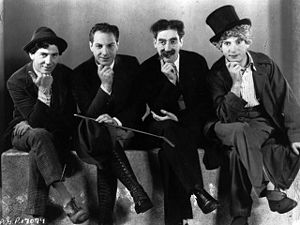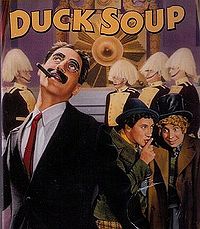Marx Brothers
 From Conservapedia
From Conservapedia 
The Marx Brothers were a successful American comedy team of the stage, screen, and television. Composed of five sons of Jewish immigrants from Europe, their act either together or solo spanned nearly seven decades, irreverently and humorously attacking high society and social norms.
Contents
- 1 Early lives
- 1.1 The nicknames
- 2 From vaudeville to film
- 3 Filmography
- 4 See also
- 5 References
Early lives[edit]
The brothers own lives and future careers would be influenced by their own family. Their mother was Miene "Minnie" Schönberg, who was born on November 9, 1864 in Dornum, East Frisia in what is now Germany. A younger brother - Abraham Elieser Adolf - was born a few years later; he would later become known as comedian and talent agent Al Shean. Their parents, father Levy a ventriloquist and mother Fanny a harpist, would emigrate to the United States in 1880, settling in New York City, and it was there at the age of 20 that Minnie met and married a tailor named Samuel Marx, an immigrant from Mertzwiller, Alsace, France who was born October 23, 1859.[1] The couple would reside with her parents on East 85th Street, in what was then the Yorkville section of the Upper East Side, an area made up of poor Italians, Germans, and Irish.
In 1886 Minnie and Sam had their first child, a son they named Manfred. He did not live out the year, succumbing to tuberculosis (or more probably influenza) at the age of seven months on 17 July 1886.[2] Five other sons would be born in the ensuing years:
- Leonard, March 22, 1887
- Adolf, November 23, 1888
- Julius Henry, October 2, 1890
- Milton, October 23, 1892
- Herbert Manfred, February 25, 1901
Originally the Marx Brothers were a singing group with Minnie managing the ensemble. Called "The Nightingales", Milton and Julius would sing on stage with Mabel O'Donnell as early as 1905,[3] but the act quickly became a variety show in burlesque and vaudeville, with each brother taking part in comic sketches and/or showcasing his musical instrument of choice. As the act developed, the brothers created distinct stage personae, and in most instances would portray that persona regardless of their character in the play.[4] Leonard played the part of a seedy Italian con man and taught himself to play the piano, sometimes ending a glissando by "shooting" the last note with his index finger. Julius was the smart alec; his act during a 1912 performance in Nacogdoches, Texas was interrupted by the audience departing over a runaway mule outside the theater, and when they returned the insults hurled at them by Julius in anger was something they actually thought was funny, leading Julius to incorporate them in future acts. Adolf - who in 1911 changed his name to Arthur (he never liked his original name) - was the mute; a poor speaking performance in one play (1914's Home Again) led to being silent in future plays, to great effect. His original character was that of an Irish ragamuffin, and it is thought that this character led him to adopt the harp as his instrument. Herbert, although funny in private, was seen as the "straight man"; in his own right he was an accomplished vocalist.
The nicknames[edit]
In 1914 four of the brothers were at the Orpheum Theatre in Galesburg, Illinois, enjoying a game of poker with a man named Art Fisher, and it was he who gave them the names that they would be remembered by since:
- Leonard: "Chico"
- Leonard was the optimist, the gambler, and Fisher noted, he was also a "chicken chaser", which was slang during that time for the pursuit of women. Originally it was spelled "Chicko", but the "K" was dropped in subsequent news reporting, leading to the mispronunciation of "cheek-o", neither of which Leonard minded too much.
- Arthur: "Harpo"
- It was given to Arthur due to his love of the harp.
- Julius: "Groucho"
- Some sources indicate that he got this nickname due to his "grouchy" personality, but Chico admitted a more accurate reason: it was a simple bag hanging around his neck as a kid, keeping his money and candy together. It was called a "grouch bag".[5]
- Milton: "Gummo"
- Fisher noted that Milton had a habit of sneaking in behind someone, similar to police and private detectives, referred to as "gumshoes" in that era.
Herbert was not part of this meeting, but his brothers offered him a name which he detested: "Zippo", apparently after a monkey in a zoo. Herbert would alter it slightly, ostensibly after the Zeppelin airships.
From vaudeville to film[edit]
The years in burlesque and vaudeville were very successful, and in 1924 they hit the big-time on Broadway with I'll Say She Is, a musical comedy that established their familiar personae: Chico the conniver with a heart of gold and a mangled Italian accent; Groucho the wisecracking master of timing and wit, leering on stage in a characterized stooped-over walk while wearing a greasepaint mustache and eyebrows; and Harpo as the silent frenzy,[6] wearing a wig, top hat, and raggedy coat from which he pulled out everything from sledge hammers to candles to steaming cups of coffee to a full-grown dog, prancing on stage with unbridled emotion, whistles, horn honking, and facial expressions which included what he called a "gookie", something that could only be described as that of look of an angry, cross-eyed fish. Both Chico's piano playing and Harpo's harp were regularly performed, to the delight of audiences. I'll Say She Is also proved to be the first appearance on stage for Zeppo, replacing Gummo who had left for managerial work.
1924 also led to a meeting with Alexander Woollcott, the leading drama critic of the time; his friendship with Harpo led to the Marx Brothers hob-nobbing with the elite of New York, despite their lack of a formal education. They would count as friends noted writers and composers such as T.S. Eliot, George Gershwin, George S. Kaufman, S.J. Perelman, and many others.
Beginning with 1929's The Cocoanuts and followed in 1930 with Animal Crackers, the Marx Brothers took to the screen for a series of long-running and widely acclaimed musical comedies. Their 1933 Duck Soup, which took potshots at the tin pot dictatorships of prewar Europe, is frequently rated one of the greatest comedies of all time (due in large part to the mirror scene, where Harpo and a look—alike do mirror images of each move; this scene has been re-enacted many times since, notably in an episode of I Love Lucy where Lucille Ball and Harpo himself do so) and one of the major anti-war films of the 1930s,[7] although it opened to critical and commercial failure at the time of its release.
While Groucho, Harpo, and Chico's characters translated easily to the cinematic medium, Zeppo's straight-man did not fare as well. Audiences did not respond to his light touch, preferring more slapstick comedy. Zeppo had also grown bored with the role, and after the success of Duck Soup, left the act for good.
The three Marx Brothers made a few more films with MGM, such as A Night at the Opera and A Day at the Races, but the quality of their work began to falter, and the act was essentially defunct by the 1950s. The brothers made one last appearance together on film with cameos in Irwin Allen's The Story of Mankind.
Filmography[edit]

- Humor Risk (1921) (Believed lost)
- The Cocoanuts (1929, Paramount)
- Animal Crackers (1930, Paramount)
- The House That Shadows Built (1931, Paramount)
- Monkey Business (1931, Paramount)
- Horse Feathers (1932, Paramount)
- Duck Soup (1933, Paramount)
- A Night at the Opera (1935, MGM)
- A Day at the Races (1937, MGM)
- Room Service (1938, RKO)
- At the Circus (1939, MGM)
- Go West (1940, MGM)
- The Big Store (1941, MGM)
- A Night in Casablanca (1946, United Artists)
- Love Happy (1949, United Artists)
- The Story of Mankind (1957, Warner Bros.)
See also[edit]
- Charlie Chaplin
- Buster Keaton
- Laurel and Hardy
References[edit]
- ↑ http://judaisme.sdv.fr/perso/marxbr/geneal.htm
- ↑ https://www.findagrave.com/cgi-bin/fg.cgi?page=gr&GRid=12415029
- ↑ Nightingales and Mascots, Marxology. Retrieved December 18, 2008.
- ↑ Monkey Business (1931), Turner Classic Movies. Retrieved December 18, 2008.
- ↑ https://www.youtube.com/watch?v=ImN6UxFL8xQ
- ↑ https://books.google.com/books?id=NEgEAAAAMBAJ&pg=PA45&lpg=PA45&dq=the+silent+frenzy+harpo&source=bl&ots=7LNlPh7oyT&sig=MUsGtdQ7wFK68oG9LxYs7-xowM0&hl=en&sa=X&ei=OBn0VJCYKY_HsQTev4D4DA&ved=0CB8Q6AEwAA#v=onepage&q=the silent frenzy harpo&f=false
- ↑ Duck Soup (1930), filmsite.org. Retrieved January 18, 2009.
Categories: [Actors] [Comedians] [New Deal] [Vaudeville] [Movies] [American Jews]
↧ Download as ZWI file | Last modified: 02/18/2023 11:17:26 | 95 views
☰ Source: https://www.conservapedia.com/Marx_Brothers | License: CC BY-SA 3.0
 ZWI signed:
ZWI signed: KSF
KSF